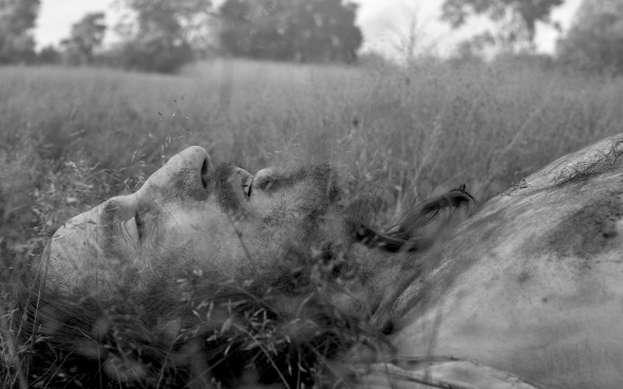|
REVIEW BY
SAM HALL PUBLISHED 17 JULY 2013 |
ALTHOUGH Ben Wheatley’s CV as a feature filmmaker is not a long one, his multi-layered, hybrid genre productions signify that he has nevertheless become a force to be reckoned with in the world of British independent film. His character-driven melting pots certainly express a signature look and Wheatley succeeds in bringing something new to his audience with each of his projects to date. His latest production, A FIELD IN ENGLAND, is not just multi-faceted in how it can be read but also in its simultaneous release in cinemas, on television, DVD, Blu-ray and video-on-demand, offering the audience a choice in how they experience the film.
Set in an idyllic, yet occasionally bleak, empty landscape during the English Civil War, A FIELD IN ENGLAND follows four deserters lead by Whitehead, an educated and yet timid protagonist, played by Reese Shearsmith of the famously surreal black comedy LEAGUE OF GENTLEMAN (1999-2002). Joining him are Cutler (Ryan Pope), Jacob (Peter Ferdinando) and “Friend” (Richard Glover) who are collectively banding together in search of an alehouse. Their journey is cut short however once they encounter the mysterious O’Neill (Michael Smiley), a manipulative bully of a man in search of a treasure located within the field. A FIELD IN ENGLAND – like Wheatley’s other films DOWN TERRACE (2009), KILL LIST (2011) and SIGHTSEERS (2012) – is a close character study but, unlike his previous work, this is his first feature shot in black and white. In a recent interview, Wheatley described one of his motivations for shooting the film in monochrome was to do away with the “distraction” of colour in order to encourage greater focus on his characters. Each line of dialogue, action sequence and choice of wardrobe communicates the motivations and the purpose behind the small cast of dissociated and disenfranchised rogues to great effect. There are clear influences at play here, particular in terms of the style. The utilisation of a field as the single location is reminiscent of the chilling Japanese drama ONIBABA (1964), through the use of setting and tonal qualities. The time period harkens back to Michael Reeves’ unforgiving horrors of THE WITCHFINDER GENERAL (1968), while the psychedelic 60s romp THE TRIP (1967) seems a precursor to the mind-bending portrayal of the effects of psychotropic mushrooms. Each of these influences lends the film a campy 60s vibe while still traversing the comedic, experimental and unnerving territory to which Wheatley’s films belong. The overall experience, as is often the case with cinematic experiments of this nature, can depend on how you choose to view the film. The choice of simultaneous distribution and exhibition on all major formats has been described by production company Film4 as an experiment itself. While TV, DVD or Blu-ray screening may offer you more control over your surroundings you are likely to find the experience of A FIELD IN ENGLAND heightened when viewed at the cinema. The larger screen brings greater depth to the characters simply through the grimy make-up jobs, and although this did uncover some of the film’s less obvious flaws, such as the fog of war effects (undoubtedly a result of the low £300,000 budget), the use of sound is much more atmospheric and engaging. The frantic opening scene, which appears to take place during a battle for example, is certainly elevated by the use of sound in a big screen environment. Ultimately, the film may suffer from an almost amateurish look yet the low budget feel is a minor flaw that is easily forgiven. The real magic lies in the performances. The simultaneously comedic and tragic peasant figures of “Friend” and Jacob recall BLACKADDER (1983-1989), but this only makes them more sympathetic despite their chequered past. Sheersmith as Whitehead brings to life a convincingly educated underling being reborn as a onetime revolutionary, while the two complex villains in O’Neill and Cutler add to the visceral grittiness of a tumultuous time period all within the confines of a small and, frankly, rather plain field. The psychedelic nature of the film only heightens it as an experience, and rather than attempting to aggravate, this aspect provides a cult-like atmosphere so as to not alienate an audience less inclined to experience the avant-garde in popular cinema. For a small experiment, Wheatley has certainly added to his CV yet another film worth talking about, ensuring that critics, fans and enthusiasts of innovative British cinema will keep watching him with anticipation. |


